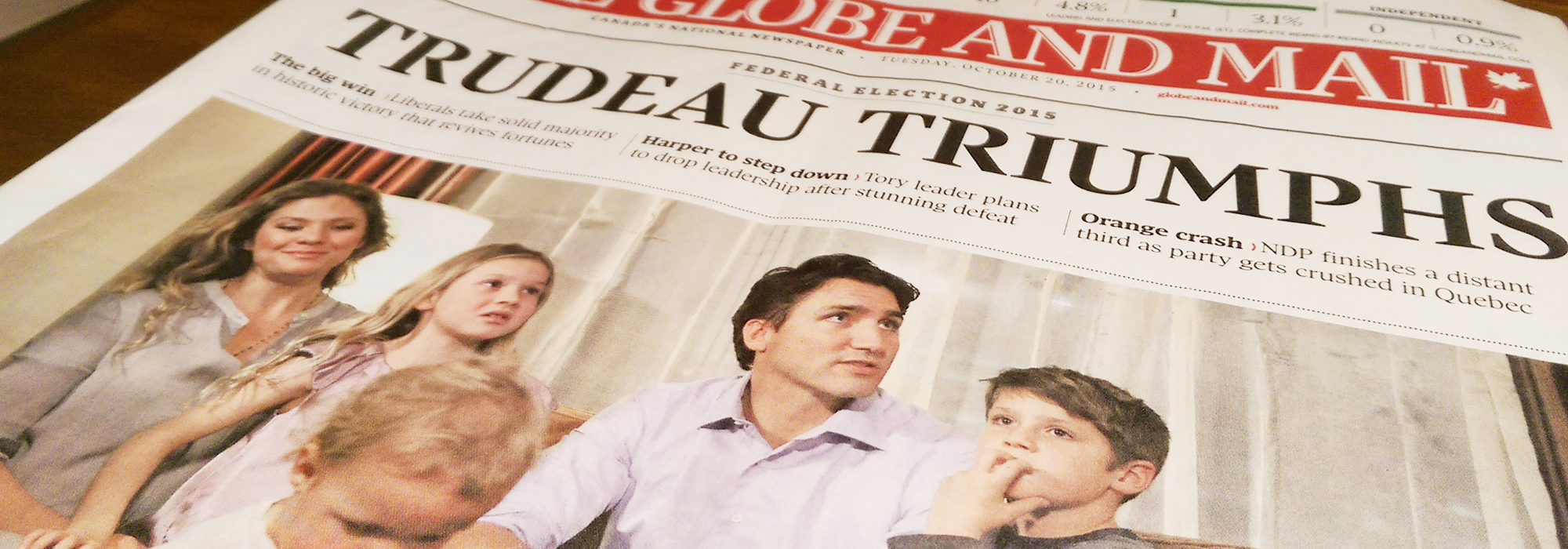
Once again, twenty-three newspapers across Canada followed the liberal free press tradition of endorsing a candidate for Prime Minister in the 2015 federal election.
In the previous federal election in 2011, twenty-two dailies did the same thing. And in that case, and astonishingly, every single newspaper across the land, except the Toronto Star, that editorially endorsed a candidate for Prime Minister touted Harper. In other words, in the 2011 federal election, 95% of editorial opinion expressed plunked for Stephen Harper – roughly three times his standing in opinion polls at the time and the results of the prior election.
So, what happened in the 2015 election?
Of the 92 paid daily newspapers in the country, only twenty-three marshalled the resources to publish an editorial at all. Most remained silent, seemingly with little to no editorial or journalistic resources to do the job, while a few such as the Winnipeg Free Press, offered satire or get out the vote efforts.
Of the twenty-three papers that did editorialize on behalf of one party or candidate, seventeen newspapers representing 70.5% of the editorial opinion expressed lined up behind the ruling Conservatives — well over twice the party’s standing once the polls closed (31.9%).
The owners of the Postmedia Group directed the ten main dailies that comprise its national chain of papers and the six major Sun dailies in London, Toronto, Ottawa, Winnipeg, Calgary, Edmonton that it acquired earlier this year to publish an editorial endorsement of Stephen Harper for Prime Minister (55% of expressed editorial opinion) against the opposition of some journalists and editors at these papers (also see Canadaland’s account of the situation). The Globe and Mail took the odd stance of endorsing the Conservatives but not Harper (15.6% of expressed editorial opinion).
The wall of support was not as pronounced on this occasion as it was last election, however. Torstar’s Toronto Star, Hamilton Spectator and Guelph Mercury (21% of expressed editorial opinion), for example, endorsed the Liberals, as did La Presse (Power Corp) (8% of expressed editorial opinion) and Charlottetown Guardian (Transcontinental) (1% of expressed editorial opinion). Overall, 30% of editorial opinion plunked for Justin Trudeau and the Liberals — about three-quarters of the Liberals’ standing at the polls.
Despite one-in-five voters casting their ballot for the NDP, there were no editorial endorsements for the party to be found. Le Devoir cast its lots with the Bloc Québécois (representing 2% of expressed editorial opinion).
The chart below depicts the scenario.
Clearly, the opinions of the largest newspaper chain in the country (Postmedia) and the Globe and Mail are well out of synch with the public mind when it comes to voting. This is a consistent pattern for both groups of papers, as I have documented now over the last two federal elections.
On the other side of the coin, the press is following well-behind voters, who turned out in droves this time to vote for the Liberals. Trudeau and the Liberal Party’s share of the popular vote was far above their share of editorial opinion. The standing of the Bloc and, especially, the NDP in the editorial rooms of the nation shows an even more pronounced disconnect.
There’s a couple of lessons in all this.
First, the commitments made to the Competition Bureau by the owners of Postmedia to maintain separate editorial lines at the Postmedia group of papers and the newly acquired Sun papers that it obtained from Quebecor earlier this year in order to get approval for the deal were made a mockery of. Such a weak reed has no place in the regulatory calculus of regulators.
Second, while there is no doubt that journalists and editors do not walk in lockstep with their owners, as Andrew Coyne’s resignation from the National Post editorial board, and protests from others across the Postmedia and Sun papers illustrate so well, it is clear that, when push comes to shove, the owners call the shots. And it is those owners who are most out of line with public opinion.
While journalists still likely have some latitude to do as they please, it is clear that (a) they work within an environment they are reasonably comfortable with ideologically and politically and (b) that they are well aware of the contours of the field from which they should not stray either too far or too often. If not, editorial endorsements remind them where those lines are.
None of this is any good for either a free press or even a commercially viable press. Being so out of synch with the citizens, and some of their own journalists, upon which the ideals of the free press rests is yet another nail in the coffin of one of the most important institutions of democracy: good quality journalism. Thankfully the people have a mind of their own and are quite able to make important decisions about who will form the next government independent of those who facelessly offer up editorial wisdom come election day.








